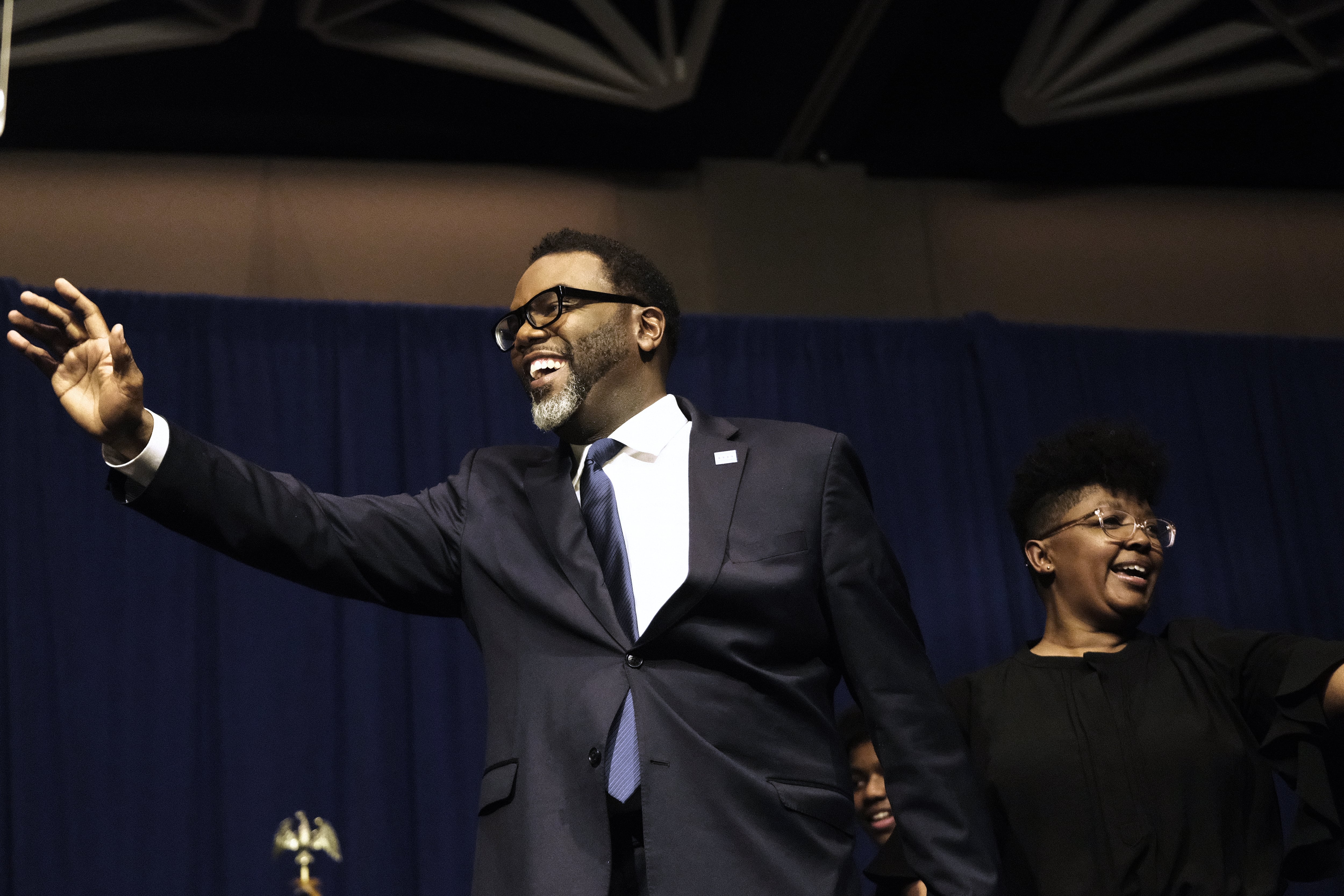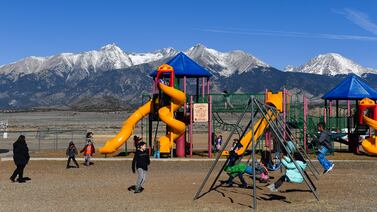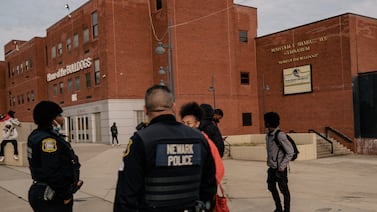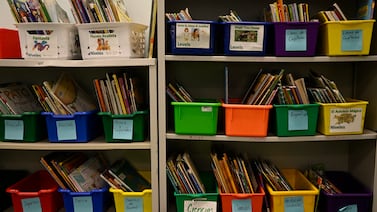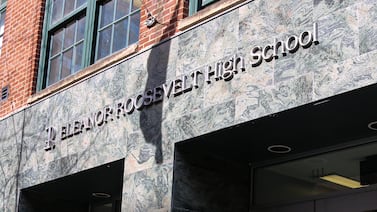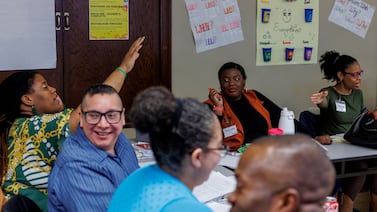Brandon Johnson took an unconventional path to becoming Chicago’s next mayor.
A decade ago, Johnson, 47, was teaching middle school at Jenner Academy of the Arts, which served mostly low-income Black students from the Cabrini-Green public housing complex. In 2012, he became an organizer for the Chicago Teachers Union, and in 2018, he was elected to the Cook County Board of Commissioners.
Now he will be the first mayor in recent memory with children in Chicago Public Schools and the last to have control of the school system before it transitions to an elected school board.
Chalkbeat Chicago sat down with Johnson for a brief interview Thursday. The following has been edited for length and clarity.
How did you talk to your own children about becoming Chicago’s mayor?
I spoke with my children about them being children. Not about me running for mayor. Our conversations were more about, “What are the things that are important to them? What are the areas of support they need from me and their mother?” We had a thoughtful conversation about their own personal desires. And that conversation led into: “Daddy’s running for mayor. You all are an important part of Daddy’s story. But you’re not running for mayor. Daddy’s running for mayor.”
It was important for me to sort of lay some of the foundation around making sure that my children know that whatever adventure that I take on, it’s attached to my purpose, and that they too will have to find their purpose. I spoke to it and in the biblical sense. As Jesus said, “We don’t bury our talents. We double, we multiply them.”
It got them thinking more about their purpose, their talents, their gifts, and how they will make a contribution to society by utilizing their gifts. The transition from running for mayor and the conversation about being mayor was pretty similar. Obviously, there’s more details around security, but my children are chill.
You will be the first mayor in recent memory that has children attending the Chicago Public Schools, and I wonder what you think of that?
I think about that (in the context of) the question about my ability to negotiate contracts particularly for the Chicago Public Schools, because I am now responsible and tasked with negotiating from the perspective of the public schools, right?
The question came up repeatedly about my ability to do that. I’m going to be negotiating that not just as a mayor, but as a parent. I want parents and students to win a good school system, not a contract. That negotiation is actually far greater now as mayor of the city of Chicago having children in the public schools.
I’m not calling for a system to be better so that other people can experience it. I’m calling for a system to be better that works through the lens of someone who trusts the system to provide the education that will ultimately prepare (my children) to fulfill their purpose. I’m going to take the lived experience of not just as a teacher, as an organizer, but as a parent.
What were the things that were frustrating for me and my wife? I’m confident that whatever we were frustrated about, there are countless other parents who have that same frustration. That will be the impetus behind whatever decision is being made or whatever dynamics are being negotiated.
How do we not only help children fulfill their purpose? How do we make sure that parents that rely on this system for their children have an experience that is not just pleasant, but that motivates parents to continue to trust and believe in this system?
What do you think the election result and your win say about how Chicagoans feel about the approach to public education policy in this city under previous mayors?
I believe that my election sets us up to fulfill a promise of what public education should be about. There’s more of an acceptance and agreement around a system that is not just equitable and just, but a system that works for every single family in the city of Chicago.
That’s the message that they accepted — that you do not necessarily have to subscribe to a stratified system, where there are winners and losers, (but that) every parent who gets what they want out of the Chicago Public Schools.
If you talk to most parents, it’s a relief. Why? Why is it a relief? Why do parents make sort of the internal motion of: “Whew! I don’t have to worry about my child’s education!”? If that’s the response of parents where they have like this relief, generally speaking, then what’s the opposite response? When you don’t get what you want or need for your children?
This election is about really eliminating these pressure points. Where you can still be curious and searching juxtaposed to “Oh, my gosh, thank God we don’t gotta worry about that.” Do you understand what I’m trying to say? I hope so.
I think so. You’re saying that because we have a system where you “win” admission to a school, then you’re happy and relieved, but if you don’t, you are just in the struggle?
We want to eliminate the struggle and the pressure of: “How do I get to a release point where I can take a deep breath?” Because that in of itself is very hostile and traumatizing, as well. There’s this dynamic of you got to be grateful because you could be at this other place.
What are we saying? We literally have places in the city of Chicago that people dread going or they’re in fear of having to attend or somehow they’re going to lose the quality of instruction or won’t be offered the fulfillment of what education should be about.
I believe people have accepted that Brandon Johnson believes that public education is far more dynamic than a bubble sheet. It’s about the fulfillment of purpose, and what is available within our public school system that sets up all of our children to be able to find their purpose, discover their purpose, and be good to live it out.
You’ve been part of a movement, built by (the late CTU President) Karen Lewis, to kind of turn the tide in Chicago when it comes to public education and mayoral control of Chicago Public Schools. What do you think about being the last mayor with control of the city’s public schools?
Karen really loved the opera. As I understand opera — and I’m going down a rabbit hole here — there’s always tragedy and triumphs, right? That’s my general frame. And I know that’s a real simplistic way to look at an incredible art, so please be gentle, I do not want to piss off opera lovers. But there’s this tragedy. There is this tension. And then you start to get to a point where there’s going to be a very dramatic end to something that would have otherwise been a constant state of tragedy.
That’s how we look at mayoral control. And to know that our movement has culminated at the very time (mayoral control ends) and we are actually really true to our word. Because anyone else would say, “Well, now that we have it, we’re good. Because we have our mayor. So let’s keep it. Let’s keep mayoral control.”
And that would be a flat note, as Karen would say. That would miss the moment. I think it’s actually quite the crescendo of the movement that pushed the political dynamics around public education, and particularly the harm of mayoral control.
Even with us being in a position where we could impose our ideology onto an entire system, we are still saying that even with us having the ability to direct traffic, we still believe that democracy is the best form of governance for our public school system. So I think it’s an incredible crescendo to our movement.
You will have some chances to appoint members of the Chicago Board of Education. Do you have any shortlist of names? Do you plan to keep any current school board members?
Well, I don’t have a shortlist of names. What I do have, though, is a commitment to a process that is committed to equity in the distribution of the seats that I have the ability to assign. We will provide a process that allows for real community input. An equitable education really requires a dynamic, diverse makeup of experiences that I believe will be necessary to have the type of democratic structure that the city of Chicago has already united around.
Becky Vevea is the bureau chief for Chalkbeat Chicago. Contact Becky at bvevea@chalkbeat.org.


